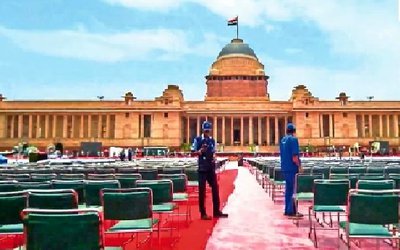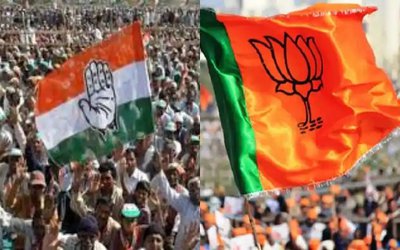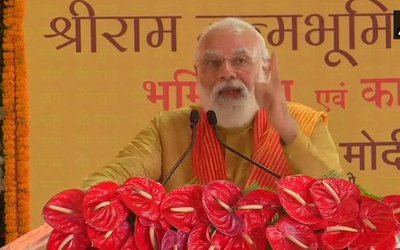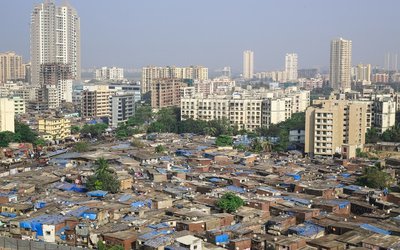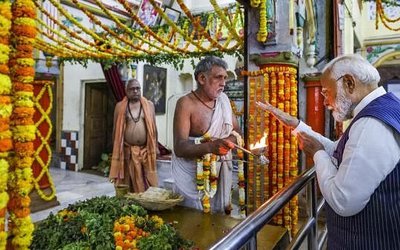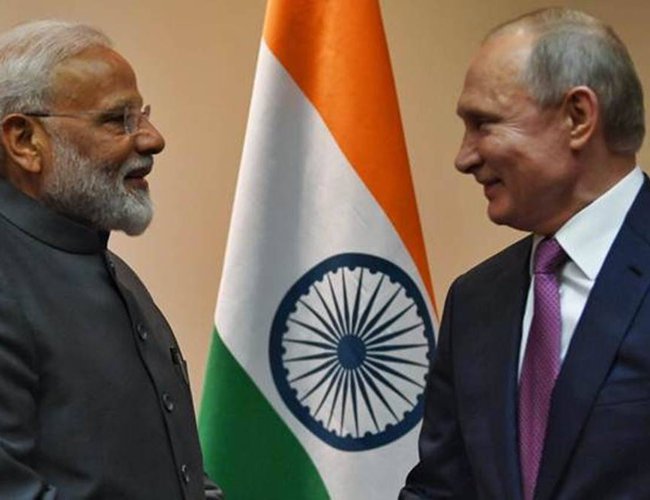
The leaders of Russia and India have agreed to step up bilateral cooperation in a wide range of fields, including military, science and technology. India also for the first time revealed that the delivery of Russian S-400 surface-to-air missile systems to the country began this month.
The first face-to-face meeting in two years between Russian President Vladimir Putin and Indian Prime Minister Narendra Modi took place in India on Monday.
A joint statement released after the talks says Russia and India agreed to renew their military and technical cooperation pact through 2031.
The countries will work together on peaceful space development, including manned space missions and planetary exploration. They also agree to set up a framework to discuss the situation in Afghanistan.
India's Foreign Secretary Harsh Vardhan Shringla referred to the Russian S-400 surface-to-air missile systems India signed a contract to purchase in 2018.
Shringla said, "supplies have begun this month and will continue to happen."
The United States fears that India's acquisition of the missile systems -- which have high radar and tracking capabilities -- will lead to intelligence leaks to Russia.
Russian Foreign Minister Sergey Lavrov said the deal to supply S-400 systems to India is being implemented, despite Washington's efforts to undermine Russian-Indian cooperation and make India buy US weapons.
Prior to the leaders' meeting, the foreign and defence ministers of the two countries held their first-ever "two-plus-two" dialogue. They signed a deal to manufacture more than 600,000 Russian-designed assault rifles in India.
India signed four agreements with Russia at the first 2+2 meeting between the foreign and defence ministers of the two countries on Monday, and talks included the mention of Chinese aggression by New Delhi and the Covid-19 pandemic.
Defence Minister Rajnath Singh on Monday met his Russian counterpart Sergey Shoigu and the two sides signed two contracts for the manufacture of nearly 600,000 AK-203 rifles under a joint venture in Amethi, Uttar Pradesh. The deal, worth over Rs 5,000 crore, was cleared by the government just days ago.
Apart from the agreement for the Kalashnikov rifles, the two countries also signed an agreement for military technology cooperation for the next decade, from 2021 to 2031, and the Protocol of the 20th India-Russia Inter-Governmental Commission on Military & Military-Technical Cooperation (IRIGC-M&MTC).
Singh said he brought up the issue of China’s aggressive posture along the northern border during his meeting with Shoigu in New Delhi.
He said “the pandemic, the extraordinary militarisation and expansion of armament in our neighbourhood and the completely unprovoked aggression on our northern border since early summer of 2020 have thrown in several challenges”. India is “confident of overcoming these challenges with its strong political will and inherent capability of its people”, the Indian defence minister added.
The 2+2 meeting was preceded by the IRIGC-M&MTC meeting, where Singh led the Indian delegation. It included Chief of Defence Staff General Bipin Rawat, the three service chiefs and other senior officials of the Defence Ministry.
Singh appreciated Russia’s “strong support for India” and asserted that their close cooperation is not targeted against another country. Defence cooperation, he said, was one of the most important pillars of the bilateral partnership. The IRIGC-M&MTC “is a well-established mechanism since last two decades” and provides “a platform to discuss and implement mutually agreed agenda for defence cooperation”.
Separately, External Affairs Minister S Jaishankar met Russian Foreign Minister Sergey Lavrov and said they were meeting at a “critical juncture in the global geopolitical environment”, especially in the “aftermath of the Covid-19 pandemic”.
“Our discussions today will address the emergence of multipolarity and rebalancing as we look to the consequences of over centralized globalization. The Covid-19 pandemic has raised questions about the current model of global affairs, but the long standing challenges remain even as new ones emerge, prominent among them are terrorism violent extremism and radicalization. The situation in Afghanistan has wider repercussions including for Central Asia… the Middle East continues to present hotspots. Maritime security and safety is another domain of shared concern. We both have a common interest in ASEAN centrality and ASEAN-driven platforms,” Jaishankar said.
Lavrov said both Russia and India have a “similar worldview of more poly-centric, more multipolar, more equitable world order”.
During the 2+2, Singh said his ministry urged for greater military cooperation, including in research and production. “Separately, we proposed greater engagements in Central Asia and the Indian Ocean Region.”
One of the big-ticket defence deals between the two countries includes India’s purchase of five units of S-400 Triumf air defence system, delivery of which has already begun. The US$ 5.5-billion deal was signed in 2018.
Russia has been one of the largest arms exporters to India. Even as Russia’s share in India’s arms imports fell by over 50 per cent in the last five-year period compared to the previous five years (2011–2015). In the last 20 years, India imported arms and weapons worth US$ 35 billion from Russia, according to the Stockholm International Peace Research Institute which tracks global arms trade.
Source: The Indian Express
- PM Oli Returns Home Attending UN FFD4 Summit
- Jul 05, 2025
- Trump signs into law domestic policy bill
- Jul 05, 2025
- Putin-Trump call after US halts some arms shipments to Ukraine
- Jul 04, 2025
- USAID programs officially suspended
- Jul 03, 2025
- Thailand’s Constitutional Court suspended PM Paetongtarn Shinawatra
- Jul 02, 2025
